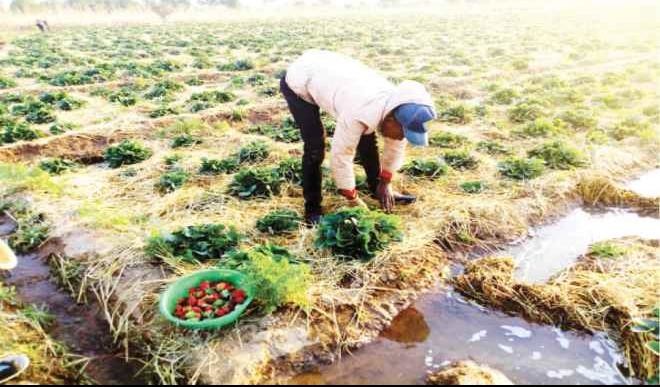Strawberry farming flourishes in Jos
Increased strawberry farming on the plateau has dispelled previously held belief that it could not be grown in Nigeria. Nigeria has huge potential for strawberry cultivation, thanks to favourable agro-ecological weather conditions. Since the cultivation started few years ago, strawberry has now found love in the hearts of the people of Chaha community and it […]


Increased strawberry farming on the plateau has dispelled previously held belief that it could not be grown in Nigeria.
Nigeria has huge potential for strawberry cultivation, thanks to favourable agro-ecological weather conditions.
Since the cultivation started few years ago, strawberry has now found love in the hearts of the people of Chaha community and it is now the most important produce that shapes the economic power of the farmers.
Chaha, which is located at the outskirt of Vom in Jos South LGA of Plateau State, is home to large numbers of farmers with only a few people in the community not cultivating the heart-shaped fruit.
This reporter went back to see if the farmers he met a few years ago are still farming the fruit and discovered that although the farmers have expanded their farms significantly, the challenges they face are still unresolved.
Elvis Choji, and his cousin, Isaac Choji, have remained in cultivation since our reporter met them in 2016 and have even expanded their farms.
Elvis’s father, Christopher Choji, a civil servant based in Abuja, has also joined in the cultivation and seems to find better market for his product elsewhere, Elvis said.
The cost of fertiliser and insecticides to combat termites, have made it difficult for many of the smallholder farmers in the community to grow.
Besides cost of fertiliser and insecticides, the cost of getting water to the farm as well as controlling rodents that destroy the plants are some other challenges the farmers face.
With regard to market for their product, many of the farmers still rely heavily on the local women who come to buy the product to hawk along the major Jos highways. Few, however, manage to get theirs to major super markets in Jos and Abuja.
Gyang Sunday, an NDII student of Plateau State Polytechnic, who started cultivating strawberry three years ago, told this reporter that he pays his school fees through what he realises from the farm.
His farm produces about four cartons every week. Each carton weighs about 5 to 6kg sand a kg sells for N1000 this add ups to approximately N20,000 per week.
The farmer, who is in his 20s, said strawberry farming helps him to deal with financial challenges that confront him daily in school, but lamented that the cost of inputs and chemicals to control insects and rodents remain his major challenge.
Like others, Polina Abbey makes money selling strawberry along the highway. She is one of the few women giving the farmers hope of remaining in business. They come to the farm every morning to buy from the farmers at N1000 per kg.
Whatever profit she makes, according to her, helps to keep their hopes alive for a better future.
Although, a farmer does not need to buy the seedlings every farming year, vines after production can be transferred as seedlings to another plot in the new farming season, which does not place any burden on the farmers each planting season.
The community has potentials for hundreds of hectares of strawberry farms, which any company or large commercial farmer could simply organize into smallholders to produce for them to export or sell locally. However, help has not come from anywhere yet – not even from the Plateau State government, which could easily attract investment into such venture that gives the state comparative advantage.
